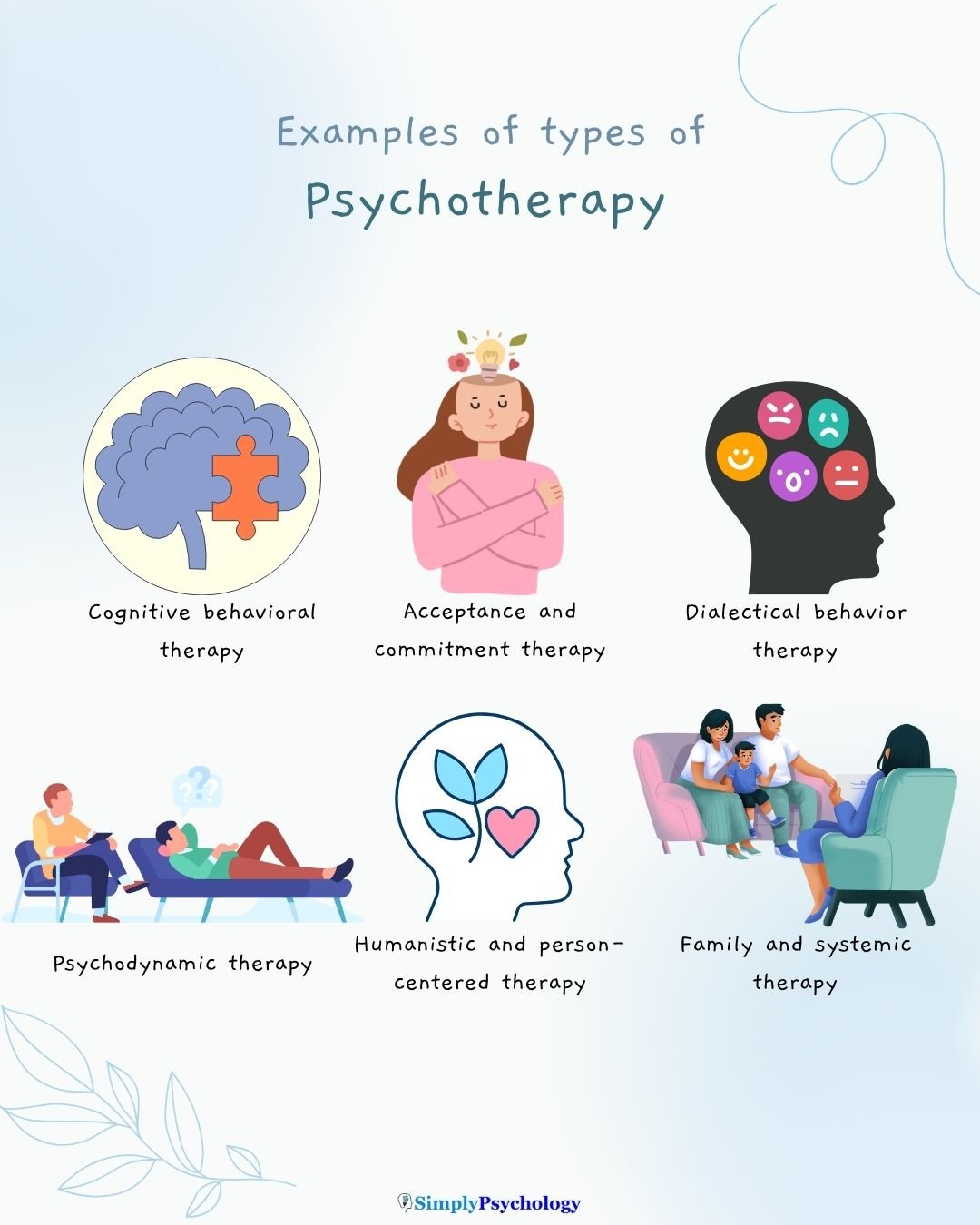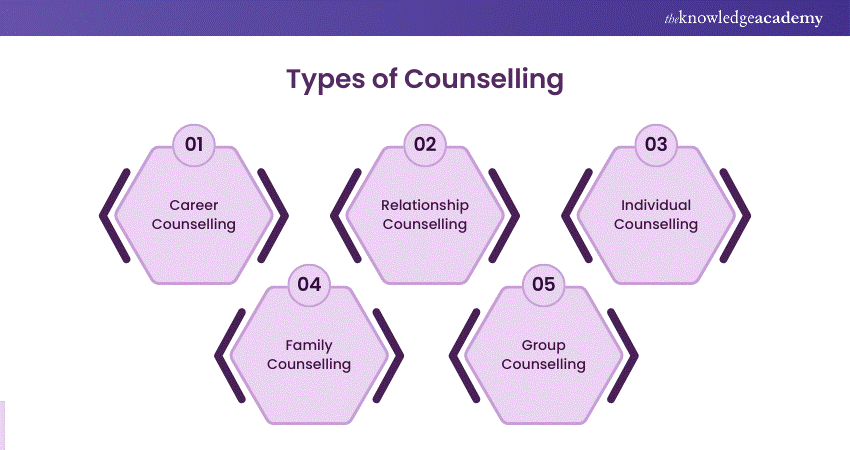Discover Everything About the Various Types of Therapy Available Today
The landscape of counselling today uses a diverse range of options tailored to fulfill varying psychological wellness needs. From specific sessions dealing with individual battles to team setups that promote shared experiences, each type offers a distinct function (relationship therapy). Couples and family treatments focus on relationship dynamics, while imaginative approaches like art treatment encourage expression. Recognizing these different approaches can reveal important tools for steering life's challenges. What might be the ideal fit for you or a person you recognize?
Individual Coaching

The procedure usually entails setting individual goals and developing coping approaches customized to the person's circumstances. Techniques might consist of cognitive-behavioral therapy, psychodynamic treatment, or mindfulness techniques, relying on the customer's choices and requirements.
Specific counselling equips customers to gain understandings right into their feelings and establish abilities to handle life's challenges effectively. This individually communication cultivates self-discovery, ultimately causing individual development and improved psychological well-being. couples counselling. For numerous, it ends up being a necessary source in navigating the intricacies of life and discovering a course to psychological durability
Couples Counselling
Couples counselling uses a structured environment for companions to resolve partnership challenges and enhance communication. It commonly focuses on problems such as dispute resolution, intimacy, and trust fund. Individuals can anticipate directed discussions that promote understanding and foster healthier communications.

Advantages of Couples Therapy
While partnerships typically encounter obstacles that can appear insurmountable, pairs counselling supplies a path to understanding and resolution. This form of treatment gives pairs with a risk-free room to explore their sensations and interact better. With assisted sessions, partners can determine patterns of habits, improve dispute resolution abilities, and foster deeper emotional connections. Pairs counselling can also improve common regard and understanding, permitting people to express their requirements and concerns honestly. By collaborating with a qualified therapist, couples can get beneficial insights into their connection dynamics. Eventually, the benefits of pairs counselling prolong beyond prompt issues, promoting healthier, more resilient partnerships that can adapt to future obstacles.
Common Problems Addressed
Several connections encounter a selection of typical issues that can be efficiently resolved via pairs counselling. Communication problems frequently emerge, causing misunderstandings and problems. Couples may battle with emotional disconnection, which can create feelings of isolation and resentment. Count on problems often appear, specifically after adultery or dishonesty, influencing the foundation of the relationship. Furthermore, differences in worths or life goals can cause considerable tension. Economic stress and anxiety can additionally stress collaborations, as disagreements concerning spending and saving can lead to problem. In addition, managing parenting duties can develop rubbing for couples dealing with child-rearing challenges. By resolving these issues in an encouraging setting, couples counselling aids partners gain insights, create much healthier interaction strategies, and job in the direction of settling their distinctions.

What to Expect
Taking part in couples counselling can be a transformative experience for partners seeking to address their relationship difficulties. Throughout sessions, pairs can expect a safe environment where they can honestly interact their feelings and problems. A qualified therapist will certainly assist conversations, aiding partners to determine patterns, boost interaction skills, and develop much healthier conflict resolution techniques.
Couples commonly take part in both individual and joint sessions, permitting for diverse point of views on the problems handy. The specialist may assign exercises or homework to strengthen skills found out during sessions. As couples progression, they might experience raised compassion and understanding in the direction of each various other, ultimately functioning towards rebuilding trust fund and affection. On the whole, couples counselling goals to cultivate a stronger, more durable partnership.
Family Therapy
Family therapy works as a vital source for resolving interpersonal dynamics within families. This therapeutic technique concentrates on improving communication and solving disputes among relative. By participating in family therapy, people can learn to comprehend one another's perspectives, promoting empathy and collaboration.
Specialists often make use of different methods to help with discussions, discover underlying issues, and advertise much healthier connections. Procedure might include all family participants or focus on specific people, depending on the requirements of the family members unit. The therapist's duty is to offer a safe environment where each member can share their ideas and feelings without judgment.
Family members treatment can be valuable for an array of concerns, consisting of divorce, sorrow, parenting obstacles, and psychological health problems. Ultimately, this kind of treatment aims to strengthen familial bonds, enhance psychological support, and equip family members with tools to browse problems, adding to general household health.
Team Therapy
Although individuals might feel separated in their battles, group counselling provides a helpful environment where they can connect with others dealing with comparable difficulties. This kind of counselling typically includes little teams led by a trained facilitator, enabling participants to share experiences and understandings in a secure room.
Group coaching cultivates a sense of community and belonging, which can be especially useful for those managing issues such as dependency, anxiety, or grief. Individuals frequently locate convenience in recognizing that they are not alone in their sensations, causing increased empathy and understanding.
The interaction within the team can also help with personal growth, as individuals obtain feedback and support from peers that might offer different point of views. Inevitably, team therapy serves as a powerful tool for recovery, advertising both specific and cumulative progression as participants collaborate towards typical goals.
Art and Play Treatment
Art and play treatment gives an imaginative outlet for people, particularly youngsters, to share emotions and experiences that might be hard to articulate vocally. This healing strategy utilizes creative activities and play to cultivate interaction, allowing people to explore their sensations in a safe and supportive atmosphere. Through drawing, painting, or participating in play situations, clients can communicate their inner thoughts and feelings without the constraints of language.
Therapists learnt this method observe the interactions and creations of their clients to gain understandings right into their moods and psychological obstacles. virtual therapy. The non-threatening nature of art and play can be specifically helpful for kids who might struggle with standard talk therapy. In addition, it promotes self-worth and analytic skills, urging personal development. In general, art and play therapy acts as an efficient methods of recovery, promoting emotional expression and understanding for individuals of any ages
Cognitive Behavior Modification (CBT)
Cognitive Behavior Treatment (CBT) is based in the core concept that ideas, sensations, and behaviors are interconnected. This healing method utilizes numerous techniques and approaches to challenge unfavorable idea patterns and promote healthier reactions. The advantages of CBT are well-documented, making it a popular selection for individuals seeking effective mental wellness therapy.

Core Concepts of CBT
Just how do thoughts affect feelings and actions? Cognitive Behavior Therapy (CBT) operates the premise that cognitive processes shape an individual's sensations and activities. This therapeutic technique highlights the interconnectedness of thoughts, emotions, and actions, suggesting that maladaptive thought patterns can bring about negative emotions and purposeless behaviors. One core concept of CBT is the recognition and adjustment of these distorted thoughts, allowing people to create much healthier cognitive structures. In addition, CBT advertises the idea of read more personal obligation, motivating clients to take an active role in their healing process. Via organized sessions, customers find out to test illogical ideas, inevitably promoting durability and improved emotional law. This emphasis on cognitive restructuring distinguishes CBT from various other healing techniques.
Techniques and Techniques
Various strategies and strategies exist within Cognitive Behavior Therapy (CBT), they all aim to promote favorable change by addressing maladaptive idea patterns. One famous strategy is cognitive restructuring, which includes identifying and testing negative ideas. Clients find out to replace these ideas with more well balanced, reasonable ideas. Behavioral activation is one more approach, motivating people to participate in activities that enhance mood and lower avoidance. Direct exposure therapy, generally used for anxiousness disorders, slowly subjects clients to been afraid scenarios, helping to reduce their anxiety actions. Additionally, mindfulness techniques may be incorporated, promoting present-moment understanding and reducing rumination. Collectively, these approaches empower individuals to establish much healthier coping mechanisms and enhance psychological regulation, laying the foundation for long-term change.
Benefits of CBT Therapy
CBT therapy provides numerous advantages that contribute to its appeal as a healing strategy. One substantial advantage is its structured format, which allows customers to set specific objectives and measure development successfully. This ambitious nature enhances motivation and accountability. Additionally, CBT outfits individuals with useful skills and techniques to handle adverse ideas and habits, promoting long-lasting self-help. Study indicates its effectiveness in treating numerous conditions, consisting of stress and anxiety, clinical depression, and stress-related disorders. Additionally, CBT sessions are normally much shorter in period contrasted to other treatments, making it more easily accessible for those with time restraints. Generally, the combination of its evidence-based methods and concentrate on empowering customers makes CBT an engaging option for numerous seeking psychological wellness assistance.
Often Asked Questions
Just how Do I Pick the Right Type of Counselling for Me?
Picking the ideal kind of counselling entails examining private requirements, preferences, and objectives. Investigating different techniques, getting in touch with experts, and considering individual convenience degrees are important action in making an informed decision for efficient support.
What Certifications Should a Counselor Have?
When thinking about certifications for a therapist, one must try to find an appropriate degree, specialist accreditation, and licensure. Additionally, experience in certain therapeutic techniques and ongoing expert advancement are crucial for effective therapy practice.
How much time Does Each Therapy Session Generally Last?
Generally, each therapy session lasts between 45 to 60 mins. Nonetheless, durations can vary relying on the counselor's approach, client demands, and specific restorative objectives, guaranteeing both adaptability and performance in the therapy process.
Is Therapy Covered by Medical Insurance Plans?
Counselling insurance coverage varies by medical insurance strategies. Some strategies consist of psychological wellness solutions, while others may have limitations or require certain carriers. It is essential for individuals to check their policy information for exact details.
Can Coaching Be Done Online or Practically?
Counselling can undoubtedly be carried out on-line or practically, enabling people to accessibility treatment from the comfort of their homes. This method has gained popularity, providing flexibility and comfort for both customers and specialists in the area.